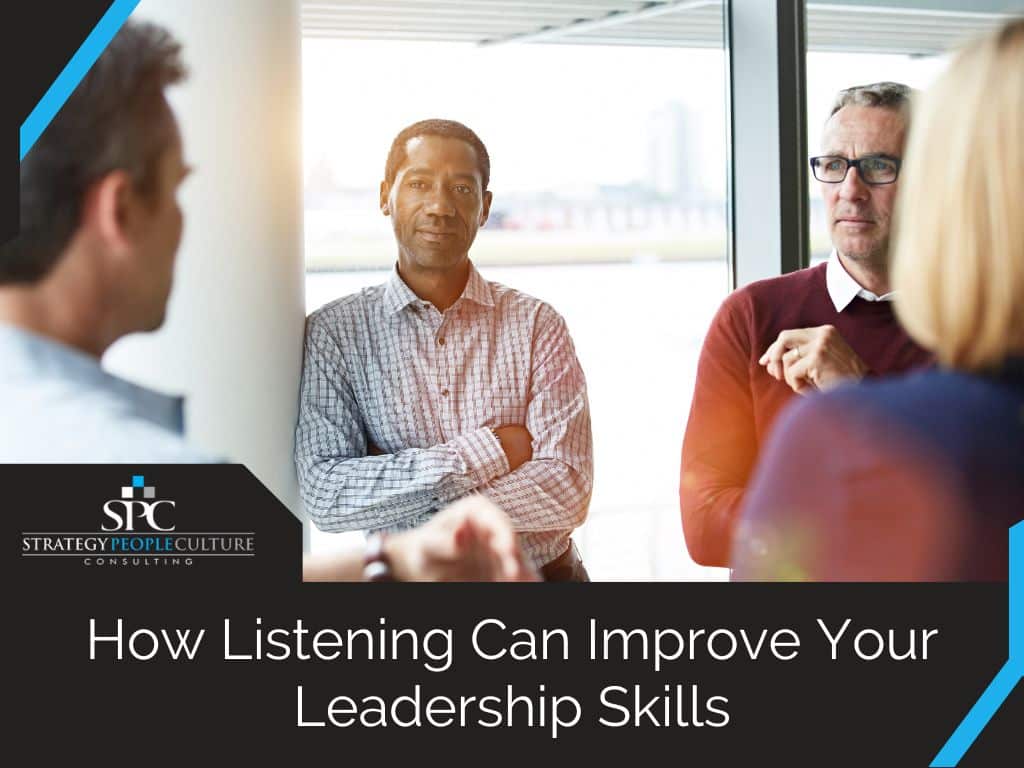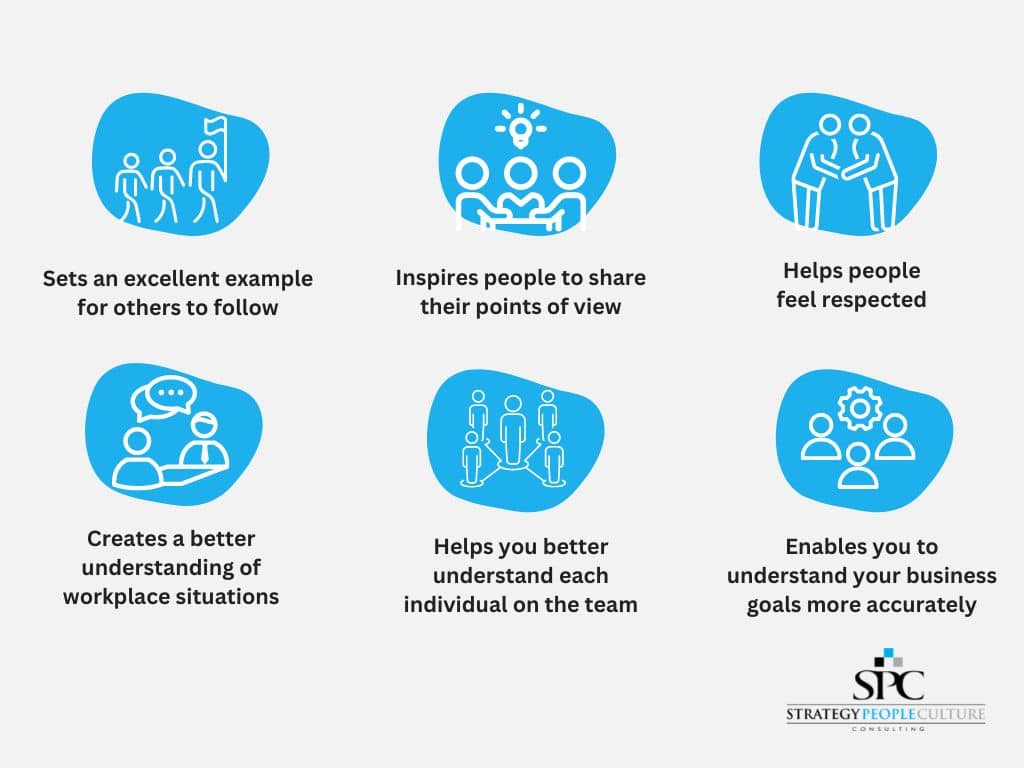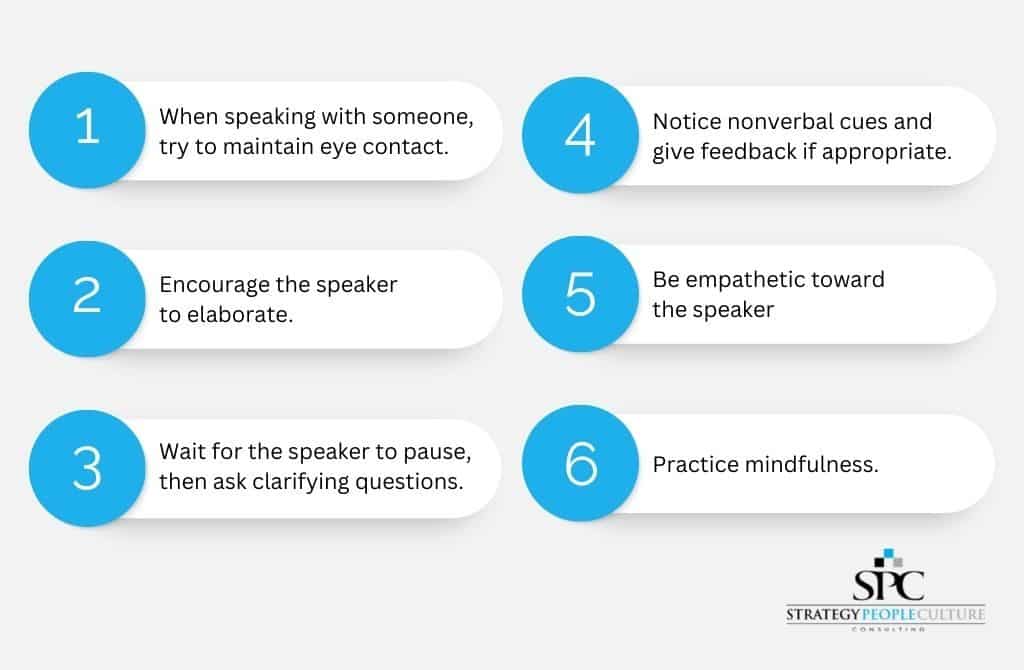How Listening Can Improve Your Leadership Skills

Have you ever had a conversation where you are speaking to coworkers, only to have their eyes glaze over, have them respond with a few “uh-huhs” or even glance periodically at their phone while you are talking? If this happens even occasionally, do you find yourself wanting to engage with this person less often? Do you judge them as rude, having a bad attitude, or disinterested in what you have to say?
It stands to reason; the same situation would be reversed for your team if they experience this from you! Many of our blog articles have emphasized clarity of communication and building trust among employees as key elements to management success. Here we talk about one of the most fundamental ways to accomplish both — effective listening.

What is Effective/Active Listening?
Listening to someone effectively means receiving a person’s spoken message and interpreting both the intended message and context accurately in a way the speaker also knows this has happened. Effective listening involves not just hearing the words and interpreting their meaning but also interpreting their implied message. Word choice, inflection, emotion, body language, and even what is not said, all play a part in receiving the intended message. Some individuals are better than others at capturing the essence of what a person is trying to say; if you aren’t one of them (most of us aren’t as good as we think), this can further complicate our ability to “effectively listen.” Whereas some people are naturally excellent at “reading” people, the rest of us need to develop this skill. And we all could benefit from greater self-awareness and improvement with the skill regardless of our natural abilities.
Effective listening requires “active listening.” What does this mean? Active listening involves being fully present in the conversation and responding appropriately to what is being said. Being fully present allows us to hear the words and inflection and see nonverbal cues. Responding appropriately means asking clarifying questions or paraphrasing what is being said to ensure you interpret the message correctly. It does not mean diverting the speaker’s message with your own examples or stories unless they help move the conversation forward toward the speaker’s point.
What Are the Benefits of Effective Listening?
As a leader, effective listening has many benefits for both you and your team. Here are a few techniques:

- It sets an excellent example for others to follow. How can you expect them to reciprocate if you do not actively listen to the people working for you? Be a teacher to your team by emphasizing your effective listening efforts to better foster an environment where everyone listens to each other and collaborates toward a common goal.
- Showing openness avoids isolating team members, reduces apathy, and inspires people to share their points of view. Research consistently indicates this leads to better business results. (Here is one interesting study on equal input from all group members conducted by Google.) Even if one team member doesn’t have the best suggestion, their idea may spark others until the winning solution is found.
- It helps people feel respected. As we covered in “Power vs. Influence: How Can it Make or Break Your Organization,” this builds trust between you and your team, which is essential for influential leadership.
- Active listening creates a better understanding of specific workplace situations. This is especially important if a project has conflict, doubt, or fatigue. Effective listening and understanding what the people around you are trying to communicate is part of your responsibility as a supervisor, manager, and leader.
- It helps you show interest and better understand each individual on the team and what motivates them. This insight is another essential tool in your arsenal for leading with influence to improve performance and get the job done. The more you can connect with the person, beyond them simply being a resource for your business, the more likely you are to get the most out of them as resources.
- Listening to how your team shares their thoughts, concerns, and ideas better enables you to understand your business goals more accurately. An often overlooked and untapped benefit is the team around the leader. If the people around you aren’t getting your messaging, it begs the question how are the people not around (e.g., Customers) you are going to get the most out of your messaging?
All these benefits help build a better team that collaborates effectively and makes decisions more quickly. This, in turn, improves productivity, facilitates enhanced processes, and strengthens the Company. Clearly, this is good not just for your career but for the bottom line, and businesses have taken notice.
What Are Ways to Develop Effective Listening?
Developing effective listening requires two important attributes. First, it requires self-awareness to know your barriers to it. And secondly, it involves learning and practicing active listening skills until they become a habit. This practice can be in each facet of your life, whether dealing with a professional employment situation, a conversation with a customer, a friend, your mom or dad, or even your children.
Know the Barriers

According to this article from Harvard University, some of the more common barriers to effective listening are:
- Prejudging the person you are listening to (or “unconscious bias“). Sometimes we subconsciously make assumptions about the authority or worthiness of a person’s spoken words due to their appearance, accents, or assumed background.
- Misunderstanding cultural cues. Similarly, we sometimes misinterpret people’s nonverbal cues because of our mental failures to appreciate our bias or recognize they follow norms other than those of your native culture. Or someone of a different culture may feel self-conscious by being aware of these differences, which may also affect their nonverbal cues.
- Listening to only words or facts without regard to context, inflection, or nonverbal messages. According to the Harvard article, less than 10% of a message is often conveyed by words alone.
- Formulating a response or rebuttal before the speaker is finished. Have you ever caught yourself answering someone before they have finished their thought? Interestingly, it can be a tendency to actively problem solve, which ironically tends to cause further problems. Have you ever begun thinking about a response before the question or thought was fully conveyed to you? We should suspend this natural tendency to hear the whole message more effectively.
- Multitasking. Effective listening requires us to temporarily unplug in today’s digital world, where we are bombarded 24/7 with messages. If you believe you are effective at responding to an email or checking your phone while listening to someone, reverse the situation and ask yourself the impression you have when someone else is doing the same thing when you are talking. Are they getting your whole message?
To help avoid these bad habits, there are a few steps we can take to practice active listening.
Steps that Promote Active Listening

- When speaking with someone, try to maintain eye contact. This is one step recommended by almost every article about active listening. Why? It helps to avoid distractions and tells the speaker they have your undivided attention. It is possible that the speaker may not maintain eye contact for reasons from self-consciousness to cultural differences. Given the rise in remote work, this becomes more challenging, especially when some participants may not have their cameras on during a remote meeting. Even when you cannot make physical eye contact, you can still keep your eyes focused on the screen of the person speaking. Failure to do so may be surprisingly obvious to the other person. Your undivided attention encourages confidence in the speaker to complete their thoughts.
- Encourage the speaker to elaborate. At times, the idea conveyed may be incomplete. Sometimes a simple “Really?” or “How?” can encourage the speaker to explain themselves more thoroughly.
- Wait for the speaker to pause, then ask clarifying questions or recap what you think was said. These can include statements like “Let me make sure I understand…” or “Do you mean…?” Asking for clarification or repeating what you think you heard helps avoid miscommunication and tells the speaker you are truly interested in their message. By waiting for a pause, you also avoid interrupting the speaker, which can put them off.
- Notice nonverbal cues and give feedback if appropriate. Do they have a smile or, conversely, a look of distress on their face, or are they making eye contact as some simple examples? It may be helpful to say, “You seem a little apprehensive…” followed by some clarifying questions that may uncover whether there is an issue with a project that may require your involvement.
- Be empathetic toward the speaker. Occasionally, someone will tell you a story not because they want advice or help. They just want to be listened to. In those instances, a simple “Yeah, that’s pretty bad,” or “Wow, you must feel great about that!” is all that is necessary to make someone feel heard.
- Practice mindfulness. This is optional, but mindfulness does provide a way to practice focus and being present in the moment, both required for active listening. The nice thing about mindfulness is that it helps us practice these skills while we are away from the work environment, giving us a little time to recharge while making us even more ready for the challenges we face at the office.
When We’re Not Sure What Needs Improvement…

It’s often difficult to figure out exactly where we could be better at effective listening. As humans, taking an unbiased look at ourselves is a challenge. Asking our team is a possibility; however, they may not feel comfortable providing honest feedback. This is especially true if our shortcomings have created trust issues within the organization. In these cases, what may be needed is an outsider’s perspective. This is where executive coaching can help.
We have been helping leaders for over a decade with what you just read about. If you are interested in exploring more about executive and leadership coaching, please do not hesitate to reach out to us. Strategy People Culture is about “Fostering better awareness for people and business!” Call us at (833) ROCK – SPC or (833-762-5772) or email us at info@strategypeopleculture.com for more information.
